|
|
|
Sort Order |
|
|
|
Items / Page
|
|
|
|
|
|
|
| Srl | Item |
| 1 |
ID:
108697
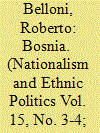

|
|
|
|
|
| Publication |
2009.
|
| Summary/Abstract |
The process of implementation of the Dayton Peace Agreement in Bosnia has come to a halt. Particularly since 2006, nationalist rhetoric has increased, political, economic, and social reforms have stalled, and some analysts warn that the country might be sliding towards collapse. This article traces the roots of the current crisis in the 2006 failed constitutional reform attempt, which has highlighted the precarious state of the Bosnian political situation and, more broadly, in the limited impact of the international community's illiberal, top-down strategies employed in the country since almost the beginning of the peace process. It concludes by suggesting the need for a new approach, led by the European Union, and aimed at reviving the domestic political process.
|
|
|
|
|
|
|
|
|
|
|
|
|
|
|
|
| 2 |
ID:
133431
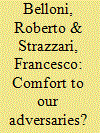

|
|
|
|
|
| Publication |
2014.
|
| Summary/Abstract |
Since the late 1990s international state builders have paid increasing attention to fighting corruption in both Bosnia-Herzegovina and Kosovo. On the surface this effort has brought significant results, since both countries have adopted legal frameworks modelled on the best practices of Western democracies. In practice, however, corruption remains rampant. This disappointing outcome has several explanations: in reviewing the empirical evidence we consider the two countries as cases involving heavily assisted transition from both socialism and war, highlighting how collusive practices between political and criminal interests have played a role in establishing formally liberal but substantively 'hybrid' institutions. We argue that the spread of corruption has been implicitly legitimised by international actors, who have pressured local parties to accept the formal architecture of good governance, including anti-corruption legislation, while turning a blind eye to those extra-legal structures and practices perceived as functional to political stability.
|
|
|
|
|
|
|
|
|
|
|
|
|
|
|
|
| 3 |
ID:
134294
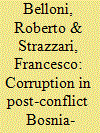

|
|
|
|
|
| Summary/Abstract |
Since the late 1990s international state builders have paid increasing attention to fighting corruption in both Bosnia-Herzegovina and Kosovo. On the surface this effort has brought significant results, since both countries have adopted legal frameworks modelled on the best practices of Western democracies. In practice, however, corruption remains rampant. This disappointing outcome has several explanations: in reviewing the empirical evidence we consider the two countries as cases involving heavily assisted transition from both socialism and war, highlighting how collusive practices between political and criminal interests have played a role in establishing formally liberal but substantively ‘hybrid’ institutions. We argue that the spread of corruption has been implicitly legitimised by international actors, who have pressured local parties to accept the formal architecture of good governance, including anti-corruption legislation, while turning a blind eye to those extra-legal structures and practices perceived as functional to political stability.
|
|
|
|
|
|
|
|
|
|
|
|
|
|
|
|
| 4 |
ID:
110234
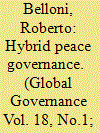

|
|
|
|
|
| Publication |
2012.
|
| Summary/Abstract |
In hybrid peace governance, liberal and illiberal norms, institutions, and actors exist alongside each other, interact, and even clash. Such a political, economic, and social order is a far cry from the liberal idea of peace based on legitimate and accountable democratic institutions, the rule of law, human rights, free media, market economy, and an open civil society. This article accounts for the emergence of hybrid peace governance and develops a typology based on the war/peace and liberal/illiberal spectra. Furthermore, it discusses the implications of hybridity and, in particular, whether it can avoid the pitfalls of top-down liberal peacebuilding and provide new opportunities for a more sustainable, locally engrained version of peace.
|
|
|
|
|
|
|
|
|
|
|
|
|
|
|
|
| 5 |
ID:
052441
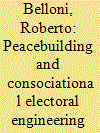

|
|
|
| 6 |
ID:
062352
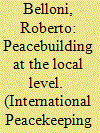

|
|
|
|
|
|
|
|